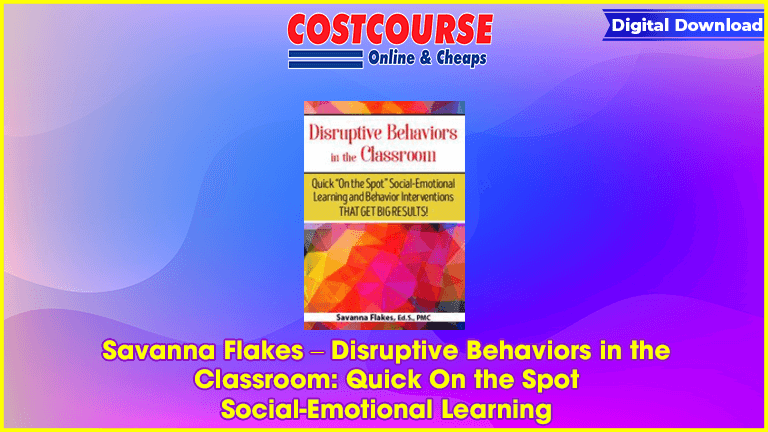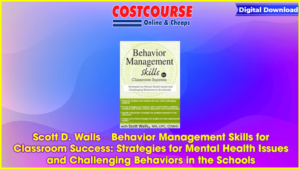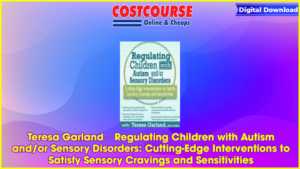Description
Everyone who works in the field of education encounters students who have difficulty managing their emotions and behavior.
These children quickly shut down, become disengaged or unmotivated and act out disrupting the classroom, which gets in the way of everyone’s learning.
Savanna Flakes – Disruptive Behaviors in the Classroom: Quick On the Spot Social-Emotional Learning and Behavior Interventions That Get Big Results!
These students need concrete emotional and behavioral interventions to support their social-emotional learning (SEL) development for social and academic success.
This comprehensive recording provides practical SEL solutions to build the mindsets, skills, and necessary supports to help young people manage their emotions, cope with challenges, and demonstrate perseverance to attain goals and healthy behaviors.
Watch and equip yourself with evidence-based intervention strategies and instructional practices to build self-awareness, self-regulation, social awareness, relationship-building and responsible decision-making skills to help your students:
Build healthy mindsets, increase engagement, motivation and decision-making skills
Invest in positive behavior and learning changes, including effective group work
Self-regulate emotions and reduce conflicts
Cope with challenges and decrease emotional distress
Reduce conduct problems and risk-taking behaviors
Stop shutting-down and reduce non-compliant behavior
Maintain positive social behaviors and relationships with peers and adults
Attain and maintain goals and healthy learning habits
Improve test scores, grades and attendance
Through interactive activities and video demonstrations you will finish this program inspired with a wealth of highly proactive and effective strategies to transform the social-emotional health of your classroom.
You will immediately be able to help your students develop responsibility for their own behavior and learning and contribute to a positive classroom environment!
Handouts
Manual – Disruptive Behaviors in the Classroom (9.50 MB) 135 Pages Available after Purchase Instructions for ASHA Credit – SELF STUDY ONLY – 12/05/19 (38.5 KB) Available after Purchase
Outline
Whole Classroom SEL Techniques and Behavior Interventions, Activities & Instructional Practices To…
Build A Positive Classroom Community
The neuroscience behind your class: Ideas for working with student diversity
Cooperative learning structures to promote teamwork: Experiential activities
Reduce classroom anxiety and increase student connection to lessons
Build positive and effective learning-based classrooms
Evidenced-based practices for the five core competencies of SEL
Develop Student Perseverance and Grit
Growth vs fixed mindset: Research-based case studies
Build perseverance: Video demonstrations
Develop resilience toward rigorous and complex tasks
Mistakes as opportunities and prevent fear of failure
Increase Student Self-Awareness
Teach them how to assess their strengths and limitations Increase self-confidence, optimism and self-efficacy
Help them identify emotions, thoughts and behaviors in different situations
Teach self-discipline and goal-setting skills
Self-monitoring techniques to track learning and academic behaviors Improve
Student Self-Regulation Skills
Model positive self-talk and effective self-reflection
Support executive-functioning needs
Develop problem-solving skills and solving conflicts
Manage and cope with emotions using evidencedbased frameworks
Develop Student Social Awareness
Teach perspective taking and empathy
Social anxiety techniques to reduce stress
Lesson plans on social and ethical norms for behavior
Manage Disruptive Behavior
Proactive and corrective measures
Practical motivational incentives
Strategies for the basic functions and needs of chronic misbehavior
Enhance Whole Class Positive Behavior Interventions
Behavior strategies to support academic success
Core elements of evidenced-based classwide reinforcement systems
Lesson plans on character education
Respond to Trauma and Tragedy
Strategies to positively support trauma impacted students
Calm the stress response related to anxiety or depression
Alternatives to zero-tolerance policies to help nurture resilience
Mitigate stress through mindfulness exercises, goalsetting activities and group identity-building







